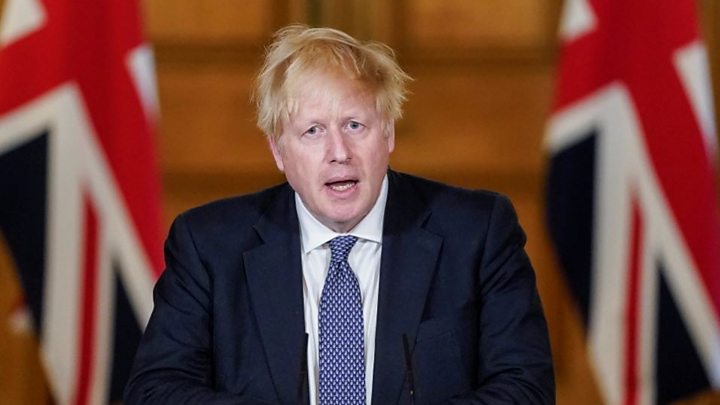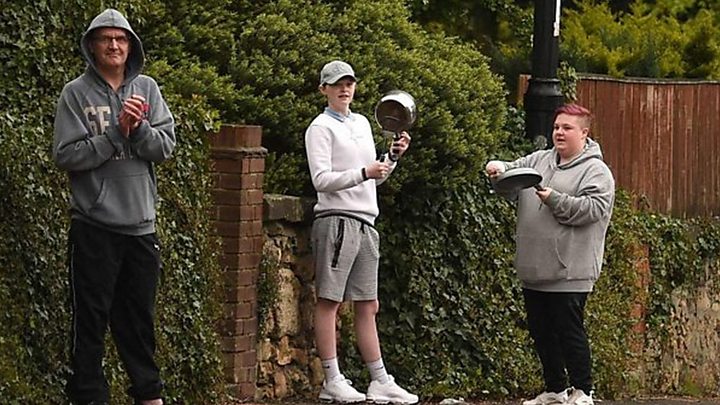Coronavirus: UK ‘likely to get close to or hit’ 100,000 tests target
The government is likely to meet or “come close” to its target of 100,000 daily coronavirus tests, Communities Secretary Robert Jenrick has said.
Health Secretary Matt Hancock said the government would achieve the aim by the end of April – which was Thursday – and those figures are expected later.
Just over 81,000 tests took place on Wednesday, but ministers said there was capacity for more.
It comes as the PM said the UK was now “past the peak” of the outbreak.
Mr Jenrick told BBC Breakfast: “I don’t have the figures yet, they’ll be published later today… but it looks like we’ll either meet the target or come close.”
He added the target was “an important stepping stone” to more testing.
It comes after Transport Secretary Grant Shapps told BBC One’s Question Time on Thursday evening that the government was “likely to get very close to or meet” its target.
The total number of people who have died after testing positive for Covid-19 in UK hospitals and the wider community is now 26,771, the latest figures show.
- Live page: One million recoveries recorded worldwide
- Do British people still accept the lockdown?
- How will coronavirus change the way we live?
Former health secretary Jeremy Hunt, who now chairs the Commons health committee, said it would be an “enormous achievement” to reach 100,000 tests.
“Of course 100,000 is in some ways an arbitrary number but setting a target like that is how you get things done in a big bureaucracy like the NHS,” he told BBC Radio 4’s Today programme.
He said the increase in testing capacity would also allow the UK to tackle the virus through contact tracing, which involves tracking down anyone who sufferers have been in prolonged contact with, to potentially ask them to self-isolate.
Shadow home secretary Nick Thomas-Symonds also said testing needed to be linked with contact tracing, adding that he hoped this would form “an important part” of the government’s exit strategy from the lockdown.
‘Comprehensive plan’
Speaking at the No 10 briefing for the first time since receiving hospital treatment for Covid-19, Prime Minister Boris Johnson said the government was “massively ramping up” testing, and that the country was now “past the peak of this disease”.
The PM added he would set out a “comprehensive plan” next week on how to restart the economy, reopen schools and help people travel to work following the coronavirus lockdown.
Labour leader Sir Keir Starmer welcomed the prime minister’s commitment to outline a plan next week as “a step in the right direction”.
Mr Thomas-Symonds said Labour hoped the plan would set out the different possibilities for the future so public services could plan ahead.
He added that the party would “scrutinise it extremely carefully” but hoped to be able to support the plan set out by the prime minister.
Some 26,771 people have now died with the virus in the UK, a rise of 674.

Mr Johnson said that to avoid the “disaster” of a second peak the UK must keep the R rate – the number of people to which one infected person will pass the virus – below one.
- Coronavirus: Is R the crucial number?
BBC political editor Laura Kuenssberg asked at what level the reproduction rate should be before the government would be “comfortable easing restrictions”.
The government’s chief medical adviser, Prof Chris Whitty, replied: “We are absolutely confident that the wrong answer is anything over one.”
He explained that as soon as the R rises above one you “restart exponential growth” and “sooner or later” the NHS would be at the risk of being overwhelmed. The current rate is thought to be between 0.6 and 0.9 across the country.
The government has set out five tests that must be met before lockdown restrictions can be eased, including:
- making sure the NHS can cope
- a “sustained and consistent” fall in the daily death rate
- rate of infection decreasing to “manageable levels”
- ensuring supply of tests and PPE can meet future demand
- and being confident any adjustments would not risk a second peak “that overwhelms the NHS”
The prime minister said it was “vital” to avoid a second peak “because that would really do economic damage”, adding that the UK must “unlock the economy gradually” while also finding ways of continuing to suppress the disease.
He said dates and times of each individual measure would be driven “by where we are in the epidemic”, and said the government was “being guided by the science”.
“What you’re going to get next week is really a road map, a menu of options,” Mr Johnson said.
Meanwhile, Welsh First Minister Mark Drakeford said any move to ease the lockdown in Wales would be “careful and cautious”, adding that “we will have to take people with us”.
“You can open up anything you like – if people don’t think it’s safe to take up what is now available to them, they won’t come,” he told BBC Radio 4’s Today programme.
- AVOIDING CONTACT: The rules on self-isolation and exercise
- HOPE AND LOSS: Your coronavirus stories
- LOOK-UP TOOL: Check cases in your area
- TESTING: Can I get tested for coronavirus?
Face masks
Mr Johnson also said face coverings will be “useful” as part of the strategy for coming out of lockdown “both for epidemiological reasons but also giving people confidence they can go back to work”.
The Scottish government already recommends people use face coverings when in shops and on public transport.
And Transport Secretary Grant Shapps told BBC One’s Question Time on Thursday evening there was a “live discussion” within government about introducing new quarantine measures at airports for people coming into the country.
Also on the BBC One programme, former chancellor George Osborne said the country did not have testing “as quick as we’d like” and went into lockdown too late, but added: “The hospitals haven’t fallen over and the capacity has been built.”

Are you trying to get a test for coronavirus? Have you already been tested? Share your experiences by emailing [email protected].
Please include a contact number if you are willing to speak to a BBC journalist. You can also contact us in the following ways:
- WhatsApp: +44 7756 165803
- Tweet: @BBC_HaveYourSay
- Send pictures/video to [email protected]
- Upload your pictures / video here
- Please read our terms conditions and privacy policy